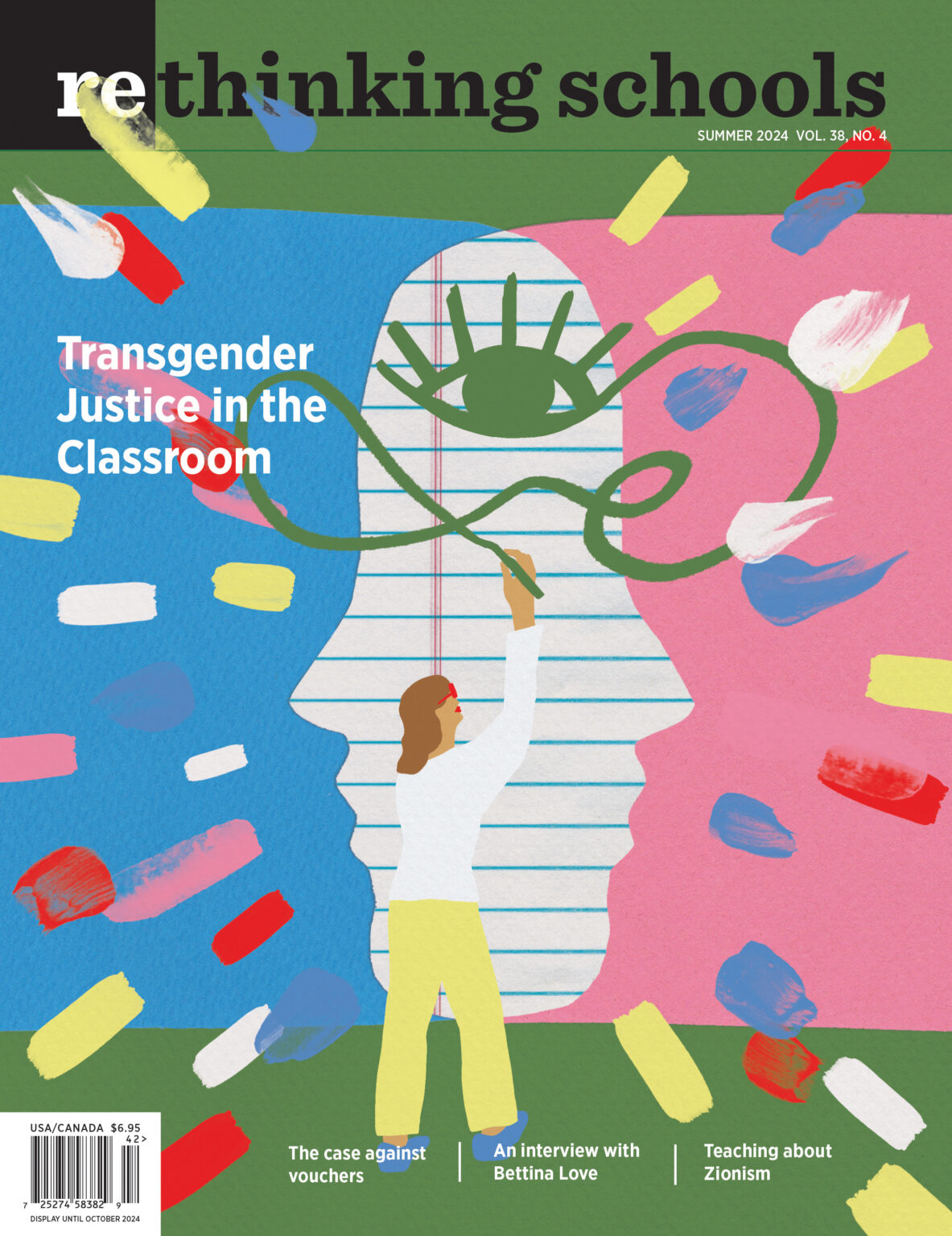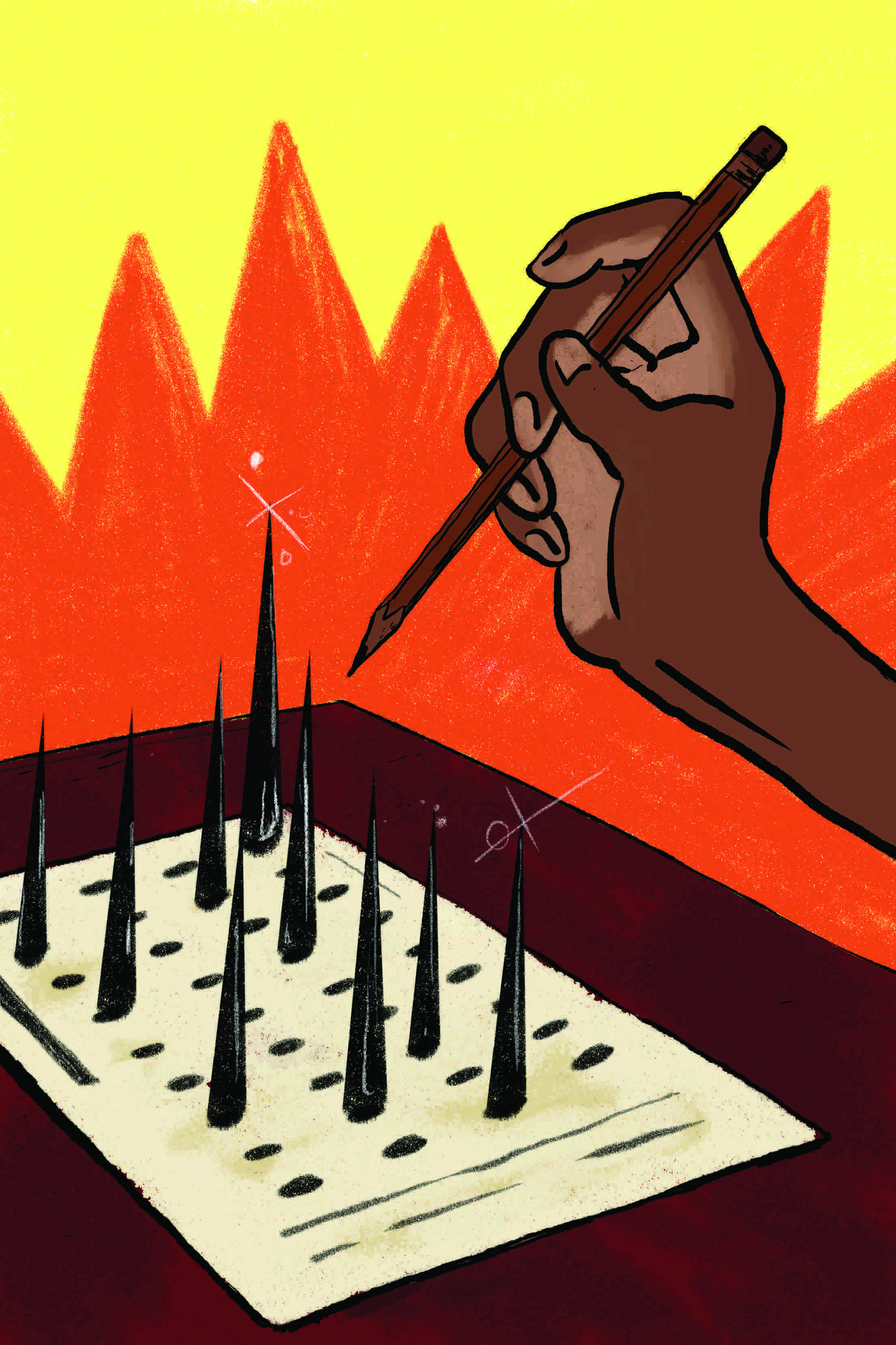Since 2020, the Zinn Education Project has hosted hundreds of Teaching for Black Lives study groups. Teachers study how to teach for Black lives and gain the collective strength to face right wing attacks. There is power in numbers.
We’re sharing some of the readings, prompts, and videos that study groups have centered in their meetings during Spring 2025.
Elk Grove, California
In February, the Elk Grove study group members read the editorial of Rethinking Schools Summer 2024 issue, “Transgender Justice in Schools: It’s a Life and Death Thing,” along with articles “Existing Outside of the Binary in the Classroom,” and “My Struggle with Identity in a White Education System.”
In March, members attended a conference on “James Baldwin and the Anti-Blackness In Me” presented by Frank Mata. Sharae Green, group coordinator, said,
The conference resonated with me in a profound way. One, as a writer, I LOVE Baldwin. Two, I never thought about MY anti-Blackness in the way that it was presented to me on a more reflective, personal level and how I personally perpetuate systemic racism and white supremacy, specifically inside of my classroom and with my students!
I’ve read “A Talk to Teachers” (p. 286) before, more than once, but not through that lens. It’s a lesson that will remain with me forever and I will continue to study it and expound upon it. Especially with all that we are facing at Harris and most importantly with our Black students and the way they are treated. And…how WE treat them.
Mountain View, California
Three elementary school teachers and a librarian from Mountain View met in February to discuss “Burned Out of Homes and History: Unearthing the silenced voices of the Tulsa Race Riot” and “The Most Gentrified City of the Century.”
Elementary teacher Matt Hillman read the line that jumped out at him from the first reading, “The complicit silence of textbooks about the history of race riots and racial exclusions that pushed Black people off their lands and out of their homes keeps our students ignorant about the reasons for the lack of economic resources in the Black community. Instead students must imagine why their people lack wealth.”
He said,
When the trauma that happened to a large group of people is not taught explicitly, everyone is left to fill in the blanks. On the far-right, you hear all these theories that are out of pocket without doing an actual study. At an age when you’re still forming your idea of the world, I can imagine how students end up internalizing some of that.
“When it comes to not speaking truth to power in textbooks,” said librarian Claire Quesnel-Oueini, as she showed the cover of the recently donated book, If You Lived When There Was Slavery in America. She said, “Look at how happy the children are depicted” and shared that she would do a critical review on the book and why it’s part of the problem.
Atlanta, Georgia
Atlanta study group members read and discussed Balwin’s “A Talk to Teachers” (p. 286) along with some of the Executive Orders and anti-DEI legislation in Georgia and across the country. Study group coordinator Chantee Earl said,
We had a speaker, Aireane Montgomery, CEO of Georgia Educators for Equity and Justice (GAEEJ), my former student, and teacher, who spoke to the group about the work she and the organization have been doing around lobbying in the legislature against anti-DEI bills, and other forms of activism and ways to engage as educators and community members. It was a really great session. Many left energized and motivated to continue doing the work in their classrooms and communities.

Des Moines, Iowa
In March, the Des Moines study group of eighteen educators reflected and shared “a moment of joy in education this week” in small groups. Educators shared the joy of seeing a student work independently who normally refuses to work, the result of an audio museum after students completed their performance tasks, witnessing disruptive students engage and ask questions in class, and hearing how students enjoyed their spring break. Haileigh Mejia, group coordinator and 6th-grade literacy special education teacher, highlighted that “we cannot have criticality without joy” and as their group continues engaging in challenging discussions, it’s important for them to note the joy that accompanies the struggle.
Members read “Jailing Our Minds” (p.230) by Abbie Cohen and “Racial Justice Is Not a Choice” (p. 243) by Wayne Au in for their monthly discussion. Mejia prompted the group to reflect on Cohen’s quote, “Democracy is healthiest when our educational institutions reflect our best virtues – creativity, joy, and growth.”
One member said, “I don’t feel the democracy with which I live under is healthy and likewise I would say I don’t see creativity, joy, and even close to the growth I’d like to see in my students being centered and a regular part of their lives here in school.”
Mejia then asked members to collectively list out the different types of assessments their students and themselves experience in their school environment and whether they align with traditional, restorative, or transformational forms of assessment. Acknowledging that most of their assessments are in the traditional category, group members reflected on Au’s definition of high stakes testing — “they determine what knowledge and content is considered legitimate for teaching” — how that translates to their classroom.
One member said, “The standardized test does not tell me what my students know. It’s problem creating rather than problem solving.”
Another member said, “We are required to meet specific standards which do not take into consideration specific cultural norms. For example, I’m predicting we will have a large group of students absent next week because they will be continuing to celebrate the end of Ramadan. That’s a part of their culture and environment and it should be honored. We should not be having to do an attendance call because you missed four days of school because you were celebrating your personal religion.”
To wrap up the discussion, Mejia raised a few questions,
Are we stuck this way? What control do we have? Can we adjust the way we assess and hopefully move down the spectrum towards transformative assessments?
If we’re not transforming and actually changing the systems, it doesn’t do any good to restore the harm if we’re not trying to disrupt and prevent it from happening again.
Baltimore, Maryland
The Baltimore study group meets monthly followed by a meditation session. Group coordinator and high school teacher Tonette Campbell said,
“Beyond Just a Cells Unit” (p. 114) had particular significance in Baltimore, where students and teachers are acutely aware of Johns Hopkins’ history of medical exploitation of Black bodies. This piece sparked conversations about medical racism, bodily autonomy, and ethical considerations in science and healthcare. It also connected to broader themes of how Black people have been used for experimentation without consent and how these injustices still influence healthcare disparities today.
“When Black Lives Mattered: Why Teach Reconstruction” (p. 96) fostered deeper discussions on how Reconstruction was a pivotal period of Black political power that was systematically undermined. Students and educators discussed how the pendulum of progress and regression continues today, drawing links between past voter suppression tactics and modern-day efforts to disenfranchise Black voters. The article also reinforced the importance of teaching Reconstruction as a critical foundation for understanding current racial and political struggles.
Section 3: Gentrification, Displacement, and Anti-Blackness was particularly impactful during Black History Month when multiple U.S. history classes participated in a lesson on redlining and gentrification. Students explored how policies of segregation and housing discrimination continue to shape Baltimore’s landscape today, displacing long-time Black residents and reinforcing racial wealth gaps. This discussion led to broader reflections on how economic policies and urban planning continue to disproportionately harm Black communities.
These readings and discussions have reinforced the need for educators to continue challenging dominant narratives, fostering critical discussions, and equipping students with historical knowledge that connects directly to their lived experiences. As educators, we are committed to documenting these conversations, advocating for curriculum changes, and ensuring that these critical lessons remain a part of our schools’ teaching practices.
Columbus, Ohio
The Columbus group split into a virtual group and in-person group to meet the needs of their members. In the spring, they met twice focusing on getting to know each other and building trust. Annie Weiler, group coordinator, said,
In both of our discussions, we were reminded of the value of learning from each other’s diverse backgrounds, wisdom, and experiences and what everyone brings to this group. It’s clear we all have a shared vision toward liberatory education, want to come away with some practical action items, and are there to support each other in this work.
Here are key takeaways from their meetings:
It was noted how STEM typically isn’t included or thought of in this type of work but absolutely needs to be.
We talked about how working toward liberatory education is affected by what we’re seeing across the country in terms of politics, policies, and the hoarding of power and how we can find creative ways to amplify this work anyways.
One member shared that making a positive phone call home in the beginning of the year about a student who might typically only get negative phone calls home created trust and respect that the student did not have with some other teachers. She also shared that creating class jobs and having her students apply for them (quarterly) tremendously improved shared responsibility and collective ownership in her classroom.
Another member highlighted a couple poems that she shares with her students: “What Is School for?” and “I Am Not a Label” by Prince Ea.
Some noted how it can sometimes be hard for educators to see outside of their own story or their own journey through education, which is important to keep in mind as we discuss restructuring the education system in fair, inclusive, and liberatory ways.



